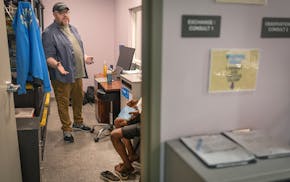If foster families got more mental health training, Alayna Ghost said she might not have been forced to move from home to home so often.
If she had guaranteed visits with her siblings, they might be closer.
And if she had more support at 18 — with housing, budgeting and navigating college financial aid — she might have avoided homelessness.
Ghost, 28, hopes insights from her 14 years in foster care lead to a better system. She and more than 120 people who are or have been in foster care in Minnesota helped shape a first-of-its-kind report that details harms from an "often disjointed, disconnected, and dehumanizing system" and offers a guide to transform it.
"We see a lot of youth, even ourselves, fail growing up in the foster care system. There's not a lot of opportunities given to us," said Ghost, who lives in Superior, Wis. "The most important goal ... is to change that for future fosters."
The 86-page report, published Thursday by the St. Paul nonprofit Foster Advocates, was developed after a couple years of listening sessions. It contains dozens of "bold ideas" on issues from health to housing to education to siblings and relationships.
They include:
- Give young people "normalcy" with financial support for school sports equipment or special events like prom, and provide phones at a certain age. Also offer classes on basics like home and car maintenance and financial management, and help youth set up checking and savings accounts.
- Expand supports for people entering adulthood and ensure they are consistent across counties. The report suggested extending financial aid and health coverage until age 26, offering a two-year mentorship program when people "age out" of foster care and providing mental health therapy alongside housing services.
- Better access to records and resources. Foster youth struggle to get their medical records, Social Security information or county case records. They also have trouble getting resources for mental health, housing, education support and other needs. Foster youth suggested peer mentors, know-your-rights guides, foster parent training and more.
- Improve informed consent in health care. Foster youth described being overmedicated, as well as challenges getting adequate medical care and mental health therapy.
- Uphold the state's Foster Care Sibling Bill of Rights. Minnesota is supposed to ensure children are placed in foster homes together when possible and separated siblings have regular visits and contact, unless it would harm a kid's safety or well-being.
Erin Gantz, 25, of West St. Paul, described being taken away from a sibling as "cruel and unusual torture." At 15, amid struggles with mental health, Gantz was placed with a foster family while her sister remained with their aunt and uncle, who the siblings had lived with for years. Gantz said she was denied contact.
"We went through hell and back together and we always knew that we had each other," Gantz said. "When I went into foster care that was taken away."
Gantz's stories were among those that shaped this new "MN Promise Report." The report says when the state removes a kid, it makes a promise to care for them better than their family "and to nurture that child every day and guide them towards full, successful lives." The system is failing to meet that promise, the report found.
A kid's outcomes can come down to luck — whether they have an incredible social worker, school counselor or foster parents, Foster Advocates Interim Executive Director Ariana Chamoun said. During listening sessions, she was disheartened to hear issues she experienced more than a decade ago persist, including failing to prepare young people for adulthood and "pushing fosters off a cliff" at 18.
The report outlines action steps for foster parents, county case workers, judges and state officials.
Department of Children, Youth, and Families Commissioner Tikki Brown said the unique report includes things the agency can do on its own, like providing guidance to county social service agencies about records to give youth leaving foster care. She said they are reviewing the document and will consider recommendations along with system partners.
"We can't build a better child welfare system without the input of those who've lived through it, because real solutions come from those who've been there," Brown said in a statement.
Changes should include stabilizing county workforces, developing supports like community resource centers and ensuring access across counties to housing and child care, Matt Freeman, executive director of the Minnesota Association of County Social Service Administrators, said in a statement.
"Counties are ready to be part of this change, but we can't, and shouldn't, do it alone," he said, noting it needs to involve the courts, legislators, schools, state agencies and others.
The report calls for a Foster Bill of Rights, which the Office of the Foster Youth Ombudsperson is pushing to ensure counties operate with the same standards and improve clarity on protections for youth. It deserves attention next legislative session, said DFL Rep. Carlie Kotyza-Witthuhn, co-chair of the Children and Families Finance and Policy Committee.
"Elevating the voices, the lived experiences of foster youth, is essential to making improvements," she said. "We have a lot of work to do."

Meth makes comeback in Minnesota in more dangerous and record ways

Brooks: Hard lives led to hard-won diplomas for these Minnesota high schoolers

Trump races to fix a big mistake: DOGE fired too many people

St. Paul sees 'unprecedented' day care closures, sending families scrambling

